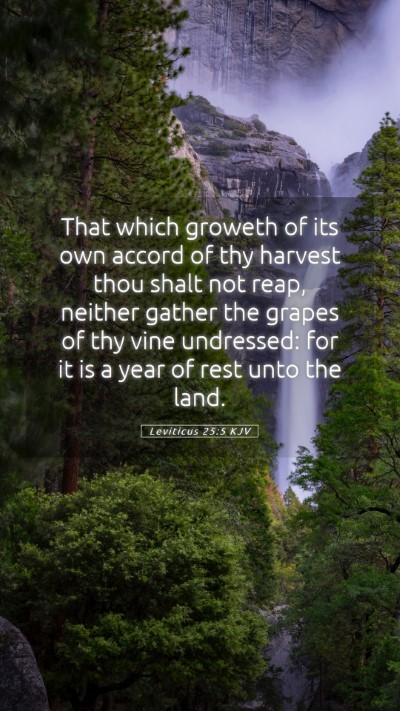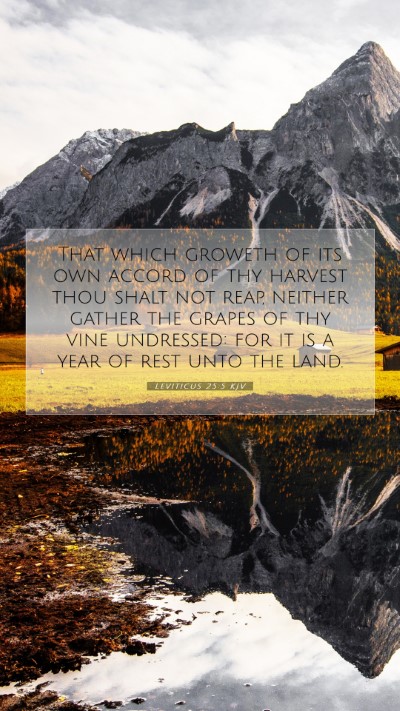Bible Verse Commentary: Leviticus 25:5
Leviticus 25:5 states, "That which groweth of its own accord of thy harvest thou shalt not reap, neither gather the grapes of thy vine undressed: for it is a year of rest unto the land." This verse is a part of God’s instructions concerning the Sabbatical year, a period when the land is allowed to rest and rejuvenate.
Understanding the Context
This commandment reflects God's concern for the sustainability of the land and the importance of rest. This principle extends beyond agriculture to a broader theological meaning regarding rest and dependence on God.
Key Insights from Commentaries
-
Matthew Henry:
Henry emphasizes the significance of the Sabbatical year, viewing it as a time ordained by God for the land to recuperate. He notes that this practice not only benefits the soil but also teaches reliance on divine provision. In this year, the abundance provided without labor serves as a reminder that God is the ultimate provider.
-
Albert Barnes:
Barnes elaborates on the divine nature of the restrictions placed in this year, suggesting that they encourage a people-centric way of life. He points out that the focus during this time shifts from productivity to nourishment, indicating God's desire for humanity to recognize the value of rest and contemplation.
-
Adam Clarke:
Clarke provides a detailed analysis of the agricultural implications of letting the land lie fallow. He indicates that this practice would create a cycle of regeneration and blessing for both the land and the people by allowing natural processes to occur without human interference.
Meanings Associated with Leviticus 25:5
The verse reflects fundamental themes within Scripture, including:
- Rest: This verse teaches the importance of rest not just for the land but symbolically for the soul, paralleling the concept of spiritual rest found in Christ.
- Divine Provision: It underscores reliance on God for sustenance, reminding believers to trust in God’s ability to provide.
- Sustainability: The command reflects wisdom in caring for creation, suggesting that the earth thrives when well-managed and given periods of rest.
Application of Leviticus 25:5 in Daily Life
This verse prompts believers to consider how they apply the principles of rest and reliance on God in their own lives. For example:
- Setting aside time for spiritual rest and rejuvenation.
- Emphasizing the importance of caring for the environment.
- Trusting in God's provision and timing in personal and communal contexts.
Cross References
To enrich understanding of Leviticus 25:5, consider these related verses:
- Exodus 23:10-11: Discusses the principle of letting the land rest.
- Deuteronomy 15:1-2: Talks about the year of release, showing God's concern for justice and mercy.
- Matthew 11:28-30: Reflects Jesus' call for rest, enhancing the concept of spiritual rejuvenation.
Conclusion
Leviticus 25:5 highlights profound biblical principles of rest, trust, and stewardship. In studying these deeper meanings, believers can cultivate a lifestyle that honors God’s creation and recognizes His provision. These lessons not only apply to the agricultural context of ancient Israel but also resonate through time into modern spiritual practices and environmental consciousness.
For further exploration on how to interpret Bible verses, consider joining Bible study groups or utilizing online Bible study resources to dive deeper into such significant scriptures.


